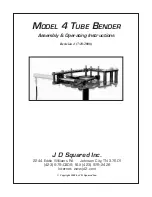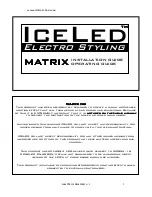
WARNING AND OPERATING INSTRUCTIONS
FOR LIFTING CAPACITIES
GENERAL
RATED LIFTING CAPACITIES apply only to the machine as
originally manufactured and normally equipped by TADANO LTD.
Modifications to the machine or use of optional equipment other
than that specified can result in a reduction of capacity.
Hydraulic cranes can be hazardous if improperly operated or
maintained. Operation and maintenance of this machine must be
in compliance with information, in the Operation Manual supplied
with the crane.If this manual is missing, order a replacement
through the distributor.
The operator and other personnel associated with this machine
shall fully acquaint themselves with the latest American National
Standards Institute (ANSI) safety standards for cranes.
SET UP
Rated lifting capacities on the chart are the maximum allowable
crane capacities and are based on the machine standing level on
firm supporting surface under ideal job conditions. Depending on
the nature of the supporting surface,it may be necessary to have
structural supports under the outrigger floats or tires to spread
the loads to a larger bearing surface.
For outrigger operation, outriggers shall be properly extended
with tires free of supporting surface before operating crane.
OPERATION
Rated lifting capacities have been tested to and meet minimum
requirements of SAE J1063-Cantilevered Boom Crane Structures
Method of Test.
Rated lifting capacities do not exceed 85% of the tipping load on
outriggers fully extended as determined by SAE J765-Crane
Stability Test Code.
Rated lifting capacities for partially extended outriggers are
determined from the formula, Rated Lifting Capacities = (Tipping
Load - 0.1 × Tip Reaction)/ 1.25.
Rated lifting capacities are based on actual load radius increased
by boom deflection.
The weight of handling device such as hook blocks, slings, etc.,
must be considered as part of the load and must be deducted
from the lifting capacities.
Rated lifting capacities are based on freely suspended loads and
make no allowance for such factors as the effect of wind,sudden
stopping of loads,supporting surface conditions, inflation of tires,
operating speeds,side loads, etc. Side pull on boom or jib is
extremely dangerous.
Such action can damage the boom, jib or slewing mechanism,
and lead to overturning of the crane.
Rated lifting capacities do not account for wind on lifted load or
boom. We recommend against working under the condition that
the load is out of control due to a strong wind. During boom
lift,consider that the rated lifting capacity is reduced by 50%
when the wind speed is 20 mph (9 m/s) to 27 mph (12 m/s);
reduced by 70% when the wind speed is 27 mph (12 m/s) to 31
mph (14 m/s). If the wind speed is 31 mph (14 m/s) or over, stop
operation. During jib lift, stop operation if the wind speed is 20
mph (9 m/s) or over.
Rated lifting capacities at load radius shall not be exceeded.
Do not tip the crane to determine allowable loads.
Do not operate at boom lengths, radii,or boom angle, where no
capacities are shown. Crane may overturn without any load on
the hook.
When boom length is between values listed, refer to the rated
lifting capacities of the next longer and next shorter booms for
the same radius. The lesser of the two rated lifting capacities
shall be used.
When making lifts at a load radius not shown, use the next
longer radius to determine allowable capacity.
Load per line should not exceed 14,600 lbs. (6,600 kg) for main
winch and auxiliary winch.
Check the actual number of parts of line with LOAD MOMENT
INDICATOR (AML-E2) before operation. Maximum lifting capacity
is restricted by the number of parts of line of LOAD MOMENT
INDICATOR (AML-E2). Limited capacity is as determined from
the formula, Single line pull for main winch 14,600 lbs. (6,600 kg)
× number of parts of line.
The boom angle before loading should be greater to account for
deflection. For rated lifting capacities,the loaded boom angle and
the load radius is for reference only.
The 39.4' (12.0 m) boom length capacities are based on boom
fully retracted. If not fully retracted [less than 53.7' (16.4 m) boom
length], use the rated lifting capacities for the 53.7' (16.4 m)
boom length.
Extension or retraction of the boom with loads may be attempted
within the limits of the RATED LIFTING CAPACITIES.
The ability to telescope loads is limited by hydraulic pressure,
boom angle, boom length,crane maintenance, etc.
For lifting capacity of single top, deduct the weight of the load
handling equipment from the rated lifting capacity of the boom.
For the lifting capacity of single top, the net capacity shall not
exceed 14,600 lbs. (6,600 kg) including the main boom hook
mass attached to the boom.
When the base jib or top jib or both jibs are removed, set the jib
state switch to the REMOVED position.
When erecting and stowing jib, be sure to retain it by hand or by
other means to prevent its free movement.
Use ”ANTI-TWOBLOCK" disable switch when erecting and
stowing jib and when stowing hook block. While the switch is
pushed,the hoist does not stop,even when overwind condition
occurs.
When lifting a load by using jib (aux. winch)and boom (main
winch) simultaneously,do the following:
・
Enter the operation status as jib operation, not as boom
operation.
・
Before starting operation,make sure that mass of load is within
rated lifting capacity for jib.
Before telescoping the boom,set the telescoping mode selector
switch to mode 1 or mode 2 fully retracted.
A change of the telescoping mode is not permissible when the
boom has been partially or fully extended.
Crane operation is prohibited without full counterweight 20,100
lbs. (9.1 ton) installed.Outriggers shall be extended 23' 11-3 / 8”
(7.3 m) spread when installing or removing removable counter-
weight.
DEFINITIONS
Load Radius: Horizontal distance from a projection of the axis of
rotation to supporting surface before loading to the center of the
vertical hoist line or tackle with load applied.
Loaded Boom Angle: The angle between the boom base section
and the horizontal, after lifting the rated lifting capacity at the
load radius.
Working Area: Area measured in a circular arc about the
centerline of rotation.
Freely Suspended Load: Load hanging free with no direct
external force applied except by the hoist line.
Side Load: Horizontal side force applied to the lifted load either
on the ground or in the air.
1.
2.
3.
1.
2.
1.
2.
3.
4.
5.
6.
7.
8.
9.
10.
11.
12.
13.
14.
15.
16.
17.
18.
19.
20.
21.
22.
1.
2.
3.
4.
5.
Form No. GR-900-4-00101/US-02
-18-







































